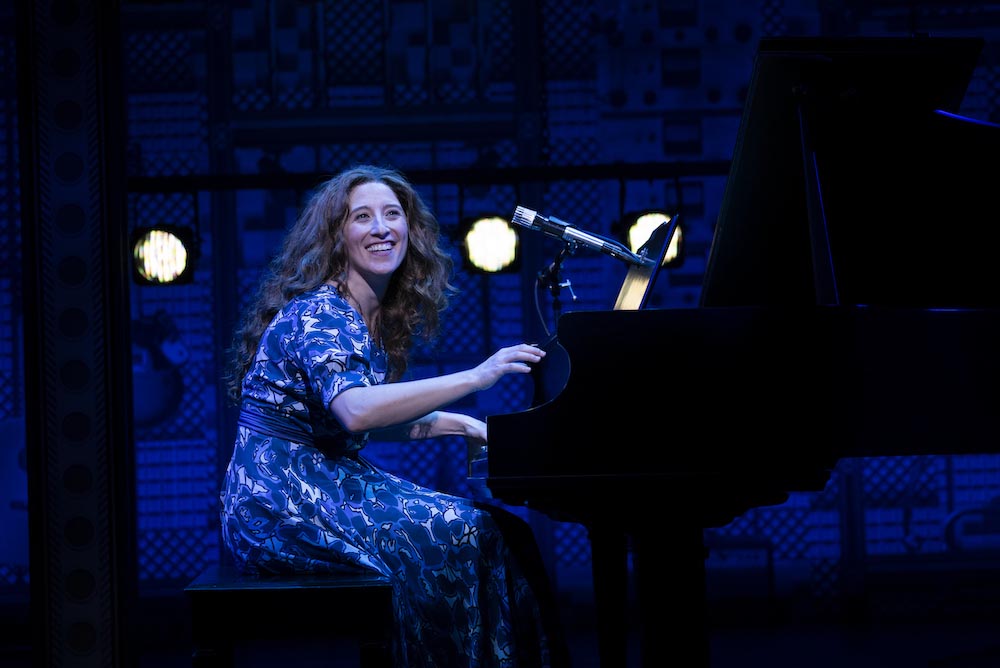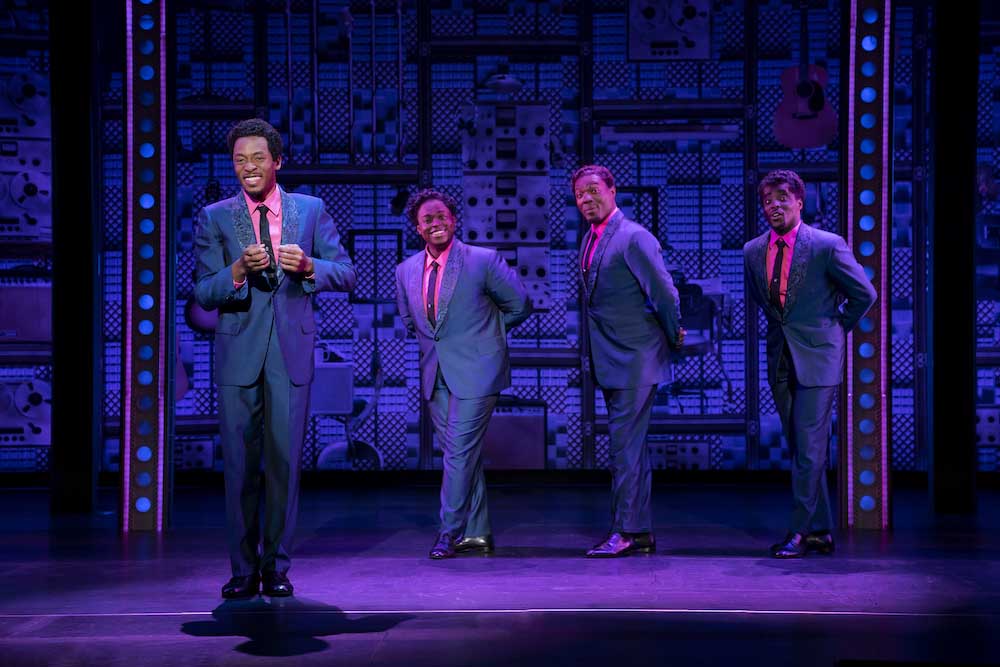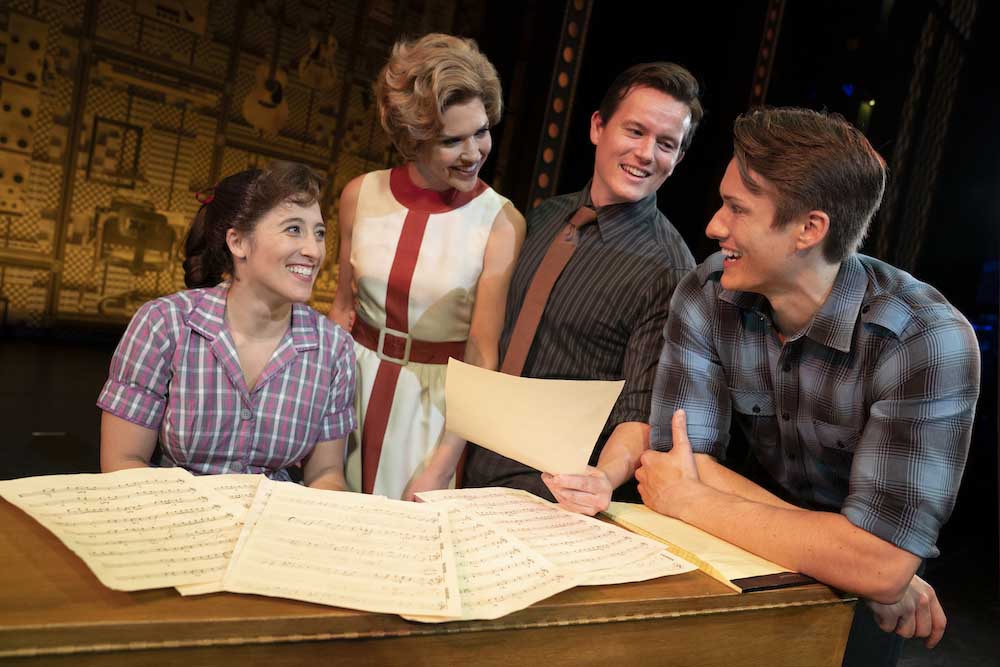There are two kinds of jukebox musicals. In one, the greatest hits of a pop singer or group are tied into a fictional plotline, as in Mama Mia. In the other, the songs are hung on a thin clothesline of moments from the subject’s biography. Jersey Boys is the prototype. Beautiful: The Carole King Musical, now playing at the Kennedy Center, fits neatly into the latter category.
This is a show you go to for the songs. And what songs they are! “Take Good Care of My Baby,” “Will You Love Me Tomorrow,” “Up On the Roof,” “You’ve Lost that Lovin’ Feeling,” “Chains,” “We Gotta Get Out of this Place,” “You’ve Got a Friend,” “A Natural Woman,” and “Beautiful” are classics, on a par with anything in the traditional American Songbook.

The singers do them justice. Sara Shepherd, in the title role, displays a stylistic range that serves more legato, lyrical numbers equally as well as her bigger, up-tempo pieces. Sara King as Cynthia Weil, Carole’s friend and competitor, unleashes an enviable belt, initially in “Happy Days Are Here Again,” a self-promotional take on the famous political anthem. James D. Gish as Carole’s husband, Gerry Goffin, and Ryan Farnsworth as Barry Mann, Cynthia’s eventual husband, hold their own with their partners vocally. Farnsworth’s take on “We Gotta Get Out of this Place” was particularly striking.
The show requires a large and versatile ensemble, often in various combinations as the Drifters or the Shirelles or in smaller supporting roles. Jamary A. Gil has a nice turn as Little Eva in “The Locomotion,” while Rosharra Francis, as Janelle Woods, leads “One Fine Day” at the end of the first act. Their powerful vocals and dynamic movement give real momentum to the ensemble scenes in the production.
The same cannot be said of Douglas McGrath’s book scenes, many of which suffer from pedestrian writing, sprinkled sporadically with good laugh lines. This is not a show that makes character acting a priority, though Matt Loehr makes something of the role of Don Kirshner, the record mogul who helped King/Goffin and Weil/Mann become successful. In the only other significant nonsinging role, Rachel Coloff does a by-the-numbers sitcom mom type as Carole’s mother, Genie Klein.

A show structured this way forces the lead to do an impersonation, rather than a characterization. Shepherd does so capably, though it seems at times that, in an attempt to set up the independent, self-confident, Carole King of 1971, she overemphasizes King’s mousiness in earlier scenes. Shepherd’s portrayal in Act Two of King’s transformation from microphone-shy to dynamite solo performer loses some impact, given that we have already seen her nailing big numbers like “Will You Love Me Tomorrow” in Act One.
Gish portrays Gerry Goffin as your basic tormented, angst-ridden artistic soul, talented in his work but dysfunctional in his relationships. Farnsworth’s Barry Mann is reminiscent of the kind of light, cheerful, romantic, sidekick character that Donald O’Connor used to play. Sara King gives Cynthia some sharp edges, making her easily the most interesting character in the lead quartet.
Something the show does well is to portray, even if in simplified fashion, the interactive working relationships among songwriters, performers, and record companies of the time.
We aren’t looking at lone, isolated creatives; we’re looking at a culture, a community even, that collectively produced memorable music. The attention the score gives to the songs of Weil/Mann, as well as to the central work of King/Goffin, underlines this point.
Josh Prince’s choreography did nicely at replicating the movement styles of the various pop performers of the period. Alan J. Plado’s pit band provided lively, on-point accompaniment to the singers in the wide variety of styles represented in the score. It was a bit odd, after Carole reworks “Will You Love Me Tomorrow” at the insistence of the Shirelles to feature strings, not to hear even simulated strings when they perform their version of the number. That actors mimed playing instruments onstage, while the band played the music, was pretty obvious at times.

The show features a multitude of costume, hair, and wig changes, and the work of Alejo Vietti and Charles G. LaPointe in those areas is an outstanding part of the production. The costumes given Cynthia and the various performing groups are particularly notable. Derek McLane’s set design was puzzling. Why a proscenium frame and sliding panels dominated by linear horizontals, verticals, and 90-degree angles for a show about creativity and musical innovation that thought outside the box of its era?
If you love the music of this period, and the work of brilliant songwriters, come to the show for the songs. Whatever the other limitations of the show, the music is worth the price of admission.
Running Time: 2 hours 30 minutes, including one intermission.
Beautiful: The Carol King Musical plays through January 2, 2022, in The Kennedy Center Eisenhower Theater, 2700 F St NW, Washington, DC. For tickets ($49–$159), call (202) 467-4600 or go online.
View the digital program for Beautiful: The Carole King Musical here.
Kennedy Center’s COVID Safety Plan is here.





Is Beautiful coming to Houston, Tx ?
Yes, according to this schedule: https://beautifulonbroadway.com/tour/